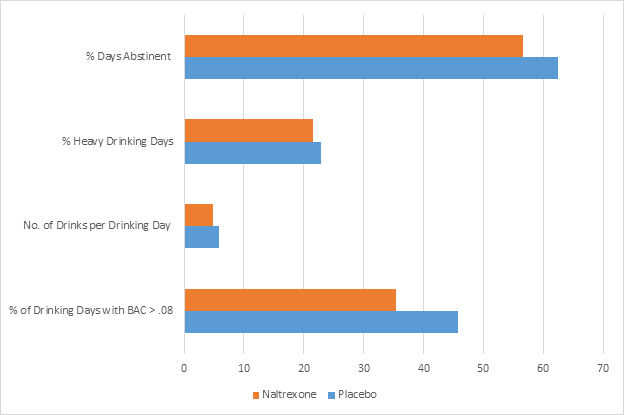The DRAM Vol. 12(1) – The use of naltrexone in treating heavy drinking among young adults
Young adults experience many social and environmental situations that encourage heavy drinking, including turning 21 and being able to legally drink alcohol for the first time. Some young adults grow out of this behavior, yet some do not—they continue to drink heavily and experience the negative consequences that follow. Recently, a team of researchers led by Stephanie O’Malley studied the effectiveness among young adults of a medication called Naltrexone, designed to reduce how fast a person consumes alcohol and their desire to drink. This week, the DRAM reviews their study[1].
What was the research question?
Does Naltrexone help heavy drinking young adults drink less?
What did the researchers do?
The researchers studied a sample of 128 young adults (18 – 25 years of age) who reported heavy drinking[2]. Over an 8-week trial, half received Naltrexone and half received a placebo, in addition to motivational counseling. The study design was a double-blind randomized clinical trial, meaning that neither the researchers nor the participants knew who received Naltrexone and who received the placebo. The researchers measured participants’ self-reported drinking over the course of the trial.
What did they find?
O’Malley and colleagues found that the participants taking Naltrexone drank less per drinking day and had a lower blood alcohol content (BAC) on days they drank when compared to the placebo group (see Figure 1). On the other hand, Naltrexone did not make much of a difference in increasing the percentage of days the participants were abstinent from alcohol, or in reducing the number of heavy drinking days.
Why do these findings matter?
Medications that control the urge to drink and make people drink less are becoming more and more important in treating substance abuse. For those suffering from the harmful consequences of prolonged heavy drinking, new research is key to understanding whom these medications help and how.
Every study has limitations. What about this one?
To be in the study, participants had to be willing to start and stick to a medication intervention, a commitment not all individuals with drinking problems are willing to make. Therefore, these results might not apply to all young adult heavy drinkers. Reports of drinking behavior also relied on the memory of participants who were engaged in heavy drinking behavior, so these reports might not be very reliable.
Figure 1. Drinking Behaviors in the Naltrexone Group Compared to the Placebo Group
Note. Differences between groups in the number of drinks per drinking day and the percent of drinking days with BAC > 0.08 were both statistically significant.
For more information:
When discussing heavy drinking, it is important to know how many, is too many. For information on how to define a standard drink, click here.
And if you or a loved one struggles with drinking or related problems please visit our First Step to Change website available here.
— Alec Conte
What do you think? Please use the comment link below to provide feedback on this article.
[1] O’Malley, S., Corbin, W., Leeman, R., Demartini, K., Fucito, L., Ikomi, J., … Kranzler, H. (2015). Reduction of Alcohol Drinking in Young Adults by Naltrexone. The Journal of Clinical Psychiatry, 76(2), 207-213.
[2] Those who had a history of serious mental health problems, a physical disease, or a recent episode of drug/opioid use were excluded from the study.
